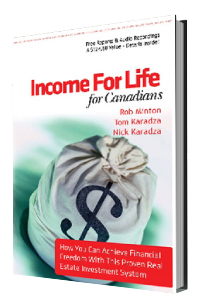"Cash Flow Is A Mystery for Canadian Real Estate Investing Beginners"
One of the most debated topics of Canadian real estate investing beginners has got to be cash flow.
So many beginning real estate investors will decide whether or not a real estate investment is good or bad based on the answer to this single question:
"Will the property produce positive monthly cash flow? Give it to me straight Tom, yes or no."
"I want a nice simple answer."
"With residential property prices going up so high I'll have to drive 24 hours straight north into the frozen tundra to find a property that cash flows these days."
Huh?
Basing your entire decision on the answer to positive cash flow question is a very limited way to look at an investment.
Sometimes there just isn't a one-word simple answer for you when you're looking to create wealth.
There are several things Canadian real estate investing beginners need to consider.
Numero uno...
How much money are you putting down on the home?
Most Canadian real estate investing beginners don't realize that it's only been since about 2006 you can buy an investment property with 10% or sometimes even 5% in Canada.
It wasn't that long ago that my local TD Branch was telling me that I had to put down 25% or even 35% down on an investment property.
So the first thing you need to consider is that there was a time when investors were putting down much more on the property as a down payment.
This lowered their mortgage amount, and therefore lowered their carrying costs, and thus resulted in a higher frequency of securing properties that produced monthly positive cash flow.
Today Canadian real estate investing beginners have the opportunity to buy investment property with 10% down or even 5% down using standard mortgage programs offered by Canadian banks (no funky hard money loans or vendor take backs - although these can be extremely useful and we'll discuss them in another article).
There are a few other things to consider.
Like, what are your financial goals?
Are you leveraging yourself for maximum advantage?
Are you using tax deductions like you should?
Are you forgetting that the mortgage is being paid down every month?
Let's use a $500,000 property and assume that you have $100,000 to invest in real estate. For you Canadian real estate investing beginners in downtown Toronto or Vancouver screaming that it's impossible, a 1 hour drive out of the city will get you properties like this.
A 20% down payment on this property would look like this:
$500,000 Purchase Price Can you rent out a $500,000 property in most parts of the country for $2,250/month or more?
Yes, definitely. Easily even.
So if you take the $2,250/month in rent and subtract the $1,909/month in carrying costs you're left with $341/month in cash flow, right?
Well that's how most Canadian real estate investing beginners look at things.
But it's not uncommon to have at least one or two $300 expenses of some sort on the property throughout the year.
A pipe leak, an electrical outlet stop working, a shingle goes flying off the roof, the furnace needs service...you get the idea.
When you're hit with one of these expenses, does your property still positively cash flow property? Hmm...yes or no?
Well, most Canadian real estate investing beginners use a very short window of analysis.
Typically, they look at a single month at a time and then when they get hit with that $300 repair they'll scream something like this:
"My property isn't a positive cash flow property any more, the sky is falling!"
But they are focusing on too small of a window.
If they look at the entire year, they'll see that even with a couple of expenses the property is still producing positive cash flow.
And here's where things differ between beginner real estate investors and experienced ones.
Experienced investors will look at the whole picture. A 12 month period, at least.
They want their money to be working as hard a possible for them.
So, they take into account things like tax deductions, depreciation and appreciation before making any decisions on whether a property is a good investment or not.
So, even if the entire positive cash flow every month is eaten up, they won't consider the property a loser.
The cash flow may be zero but the 'tax flow' may work to their advantage (Tax Flow is a term I picked up from one of our clients, love it).
Canadian real estate investing beginners often aren't aware of all the tax deductions available to them.
By using these deductions (insurance fees, legal fees, property taxes, land transfer fees, maintenance etc.), a property you thought was breaking even very well may be earning its keep.
Why?
Because tax deductions can often be written off against your other income and produce refunds for you.
The depreciation of the property should be able to do the same for you.
---------- From my experience, the middle class will focus on short time frames for analysis and to make decisions.
The wealthy look at the big picture and use a longer time frame.
They'll look at investments in ten year periods, at least.
The middle class will look at investments on a monthly basis and panic every month.
Canadian real estate investing beginners do the same.
Don't let that be you.
Look at the big picture.
Did you buy the property for a few hundred dollars in cash flow each month or for the long-term wealth that paying this property off will bring?
Another thing Canadian real estate investing beginners completely ignore is that equity that is being built up in the property each month.
Every month that mortgage is being paid you are earning a few hundred dollars in equity as the mortgage is paid down.
I know you can't touch and feel that but wealth can be built consistently with this approach.
And What About Appreciation?
You can never bank on appreciation, especially when using a window of 5 years or less.
Anyone that guarantees appreciation needs to have their head checked.
But over long periods of time, this is the most powerful accelerator of your wealth creation.
If your property appreciates at a rate of 5.5% over 5 years, you're looking at healthy returns.
Let's use the example above.
The $500,000 property after year one is worth: $527,500
After year two it's worth: $556,512 After year three it's worth: $587,120 After year four it's worth: $619,412 After year five it's worth: $653,480 That's $153,480 in appreciation or 153% return on your $100,000 down payment.
Not bad.
And that doesn't take into account tax deductions or the equity being built into the property.
Don't get caught in the Canadian real estate investing beginners trap of just focusing on the monthly returns as the basis for your decision making. Now let me be clear.
I'm not telling you to jump on any property because it's OK if it's not producing positive cash flow.
That's wrong.
You still need to do your homework. You should still be working with a mentor. You should still be picking a good investment.
In other articles, I explain why and describe the scenarios that I would jump on a negative cash flow property.
The purpose of this discussion is to expand your thinking a little.
To get you thinking like experienced investors think.
Wouldn't it be great if you could make a negative cash flowing property produce positive cash flow? And wouldn't it be great if you didn't have to pay closing costs out of your pocket so that you could save that money to buy more properties.
Well, you can do both, we've put together a report especially for Canadian real estate investing beginners that goes into the details...to learn more you can pick up a copy of our FREE Report by
clicking here. Some Cool Free Stuff... Step 1: Grab a free digital copy of our real estate investing book, Income For Life For Canadians, right here. This book has been downloaded over 22,597 times and has helped hundreds of investors kick-start their investing with simple and straight forward strategies that you can implement right here in Canada. You'll also receive our weekly [Your Life. Your Terms.] email newsletter with the latest investing updates and videos. Step 2: Free Weekly Investing Videos & Articles: Get the latest updates and join the over 10,000 other Canadians enjoying the weekly [Your Life. Your Terms.] email newsletter. The email is sent out each Thursday. And as a little bonus we'll give a FREE digital copy of the book, Income For Life For Canadians, too! Your Life. Your Terms. Step 3: Free LIVE Investing Class: Do you live in the Greater Toronto or Golden Horseshoe Area? Come out to our next introductory "Investing in Nice Homes in Nice Areas" Real Estate Class. It's 90-minutes and you'll learn a ton - promise!Thousands of investors have now joined us for this class and the feedback has always been amazing.Canadian Real Estate Investing Beginners, Let's Look At This More Closely...
$100,000 required for 20% Down Payment
$1,509/month in mortgage payments at 2.15% and a 30-year amortization
$300/month for Property Taxes
$100/month for Insurance
$1,909/month are your carrying costs
Here's what I mean...
ASIDE: I'm amazed at how many Canadian real estate investing beginners don't use a professional accountant to do their taxes. A real estate accountant can really work magic with your tax returns, and for the $250 it costs to use them, they'll save you at least double that in things that you didn't know how do deduct yourself. The wealthy use professionals, so should you.
----------
One More Thing Often Discounted By Beginners
Can We Maximize This Even More?
Return from Canadian Real Estate Investing Beginners to The Real Estate Investing Guide by clicking here.







